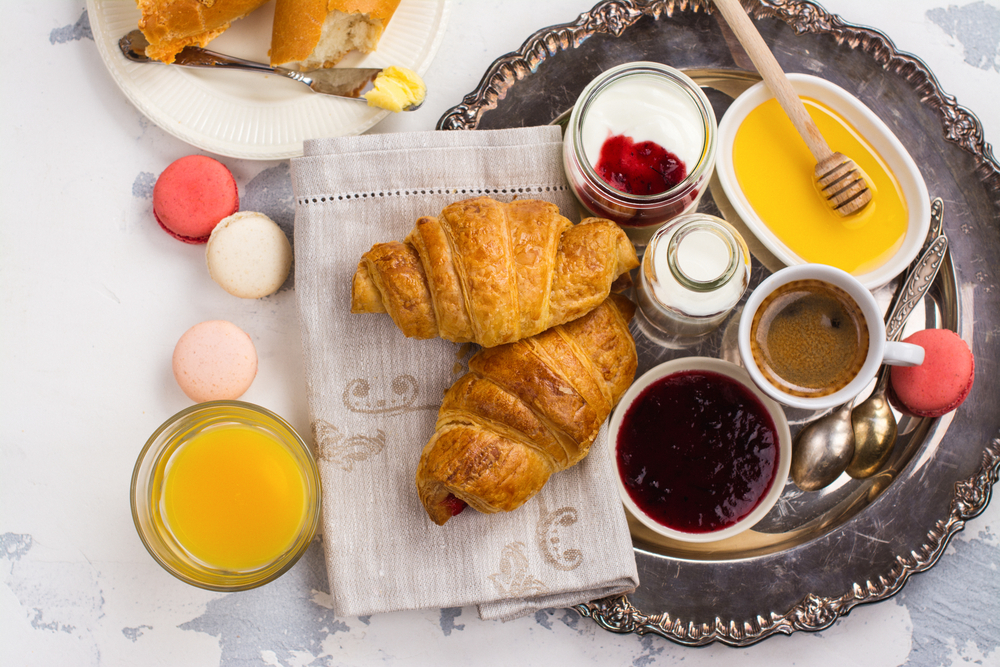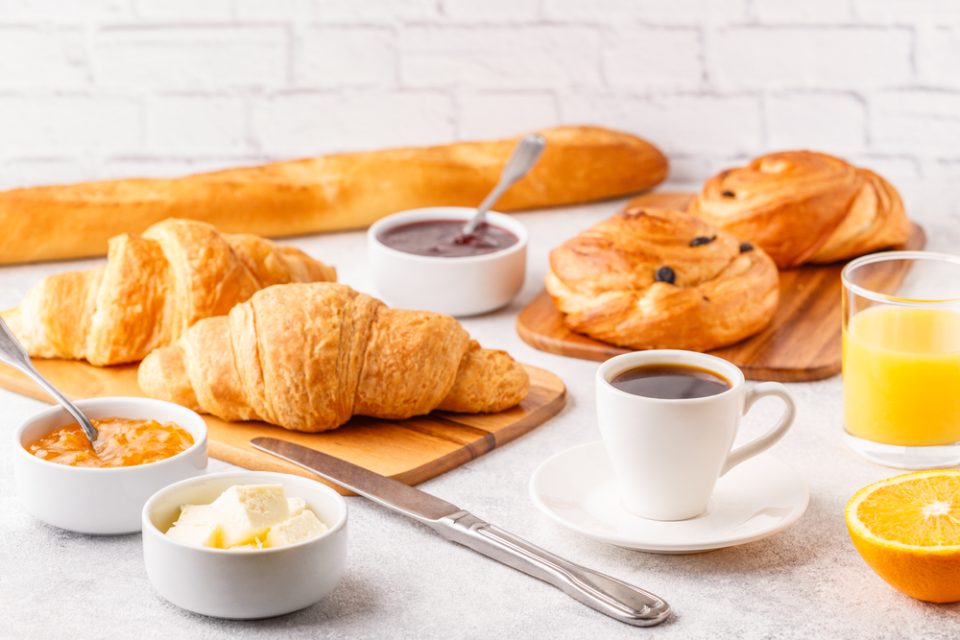
What Do The French Eat For Breakfast?
When you think of French cuisine, your mind probably wanders to elegant three-course dinners, perfectly paired wines, and decadent desserts. But what about the first meal of the day? The French approach to breakfast is refreshingly simple, yet utterly satisfying. Far from the elaborate affair you might expect from a nation renowned for its culinary prowess, a typical French breakfast is a study in restraint and quality over quantity.
If you’ve ever wondered why the French seem to stay slim whilst enjoying buttery pastries and rich foods, the answer might just lie in their breakfast philosophy. Let’s explore what really appears on French breakfast tables each morning.
The French Breakfast Philosophy
Before we dive into the specifics, it’s important to understand the French mindset when it comes to breakfast, or as they call it, “le petit déjeuner” (literally “the little lunch”). Unlike in Britain or America, where breakfast is often touted as “the most important meal of the day,” the French have always reserved that honour for lunch.
French breakfasts follow a few key principles:
- Simplicity is key. The French don’t believe in elaborate morning meals. A simple combination of bread, butter, and coffee is perfectly acceptable, and often preferred.
- Sweet over savoury. Whilst the British reach for bacon and eggs, the French overwhelmingly favour sweet options in the morning. Pastries, jams, and honey are morning staples.
- Coffee is non-negotiable. Just as wine accompanies lunch and dinner, coffee is the essential beverage at breakfast. You’ll rarely find a French person starting their day without it.
- Quality matters more than quantity. Rather than piling their plates high, the French prefer a small amount of high-quality ingredients. A single perfect croissant from the local boulangerie beats a buffet every time.
Looking for breakfast inspiration? Check out our post explaining how to Eat Like The French: 5 French Meals For Breakfast.
The Classic French Breakfast: Tartines
At the heart of traditional French breakfast is the humble tartine. A tartine is simply a slice of fresh baguette, sliced lengthwise, spread generously with butter and topped with jam or honey. It’s then dipped into a bowl of café au lait or hot chocolate.
The beauty of tartines lies in their simplicity. The bread must be fresh – ideally from that morning’s bakery run – and the butter should be good quality, preferably French butter with its distinctive rich, creamy flavour. The jam is typically homemade or from a trusted artisan producer, with apricot, strawberry, and cherry being perennial favourites.
Top Tip: For an authentic experience at home, warm your baguette slightly before spreading the butter. The heat will melt it just enough to create that perfect texture the French adore.
Viennoiseries: The Pastry Selection
Of course, no discussion of French breakfast would be complete without mentioning viennoiseries – the category of breakfast pastries that includes croissants, pain au chocolat, and pain aux raisins.
Croissants
The croissant needs little introduction. These buttery, flaky crescents are perhaps France’s most iconic breakfast export. A proper French croissant should be golden-brown, with visible layers and a slight sheen from the butter. When you tear it open, it should be airy and light, not dense or doughy.
In France, croissants come in two varieties: croissants au beurre (made with butter) and croissants ordinaires (made with margarine). The French, naturally, prefer the former, which are often distinguished by their straight shape rather than curved.
Pain au Chocolat
Also known as chocolatine in southwestern France, this rectangular pastry filled with dark chocolate batons is a morning favourite, especially among children and those with a sweet tooth. The chocolate should be just slightly melted from the warmth of the pastry, creating a delightful contrast of textures.
Pain aux Raisins
These spiral-shaped pastries filled with crème pâtissière and studded with raisins offer a slightly more indulgent breakfast option. Less common than croissants or pain au chocolat, they’re still a beloved choice for weekend breakfasts.
Brioche: The Breakfast Bread
Brioche occupies a special place in French breakfast culture. This rich, slightly sweet bread made with eggs and butter sits somewhere between bread and cake. It’s soft, tender, and utterly delicious whether eaten plain, toasted with butter, or used for French toast (which, ironically, the French call “pain perdu” or “lost bread”).
Many French people grab a brioche on their way to work, eating it on the go with a takeaway coffee – a relatively modern practice that would have horrified previous generations but is now widely accepted in urban areas.
French Breakfast Beverages
Coffee Culture
Coffee is absolutely central to the French breakfast experience. The preferred morning coffee is café au lait – equal parts strong coffee and hot milk, served in a large bowl rather than a cup. Yes, you read that correctly; a bowl. This allows for the time-honoured tradition of dunking your tartine or croissant.
Other popular coffee options include:
- Café crème: Similar to café au lait but made with espresso
- Café noisette: An espresso with just a splash of milk
- Café allongé: A long black coffee, similar to an Americano
Hot Chocolate
For children and those who prefer something sweeter, hot chocolate (chocolat chaud) is a popular choice. French hot chocolate is typically richer and thicker than its British or American counterparts, made with real chocolate rather than cocoa powder.
Fresh Orange Juice
Whilst not as ubiquitous as coffee, fresh orange juice (jus d’orange pressé) is increasingly common at French breakfast tables, particularly in hotels and cafés. The French preference is always for freshly squeezed juice, never from concentrate.
The Weekend Breakfast: A Slightly More Elaborate Affair
Whilst weekday breakfasts in France are quick and simple affairs, weekends offer an opportunity for a more leisurely petit déjeuner. Saturday and Sunday mornings in France are sacred – a time to slow down, linger over breakfast, and perhaps even set the table properly rather than eating standing up in the kitchen.
The weekend breakfast ritual often begins with a trip to the boulangerie. Entire families might make the morning bakery run together, selecting still-warm croissants and pains au chocolat, perhaps treating themselves to a special pastry they wouldn’t buy during the week. Back home, the table is set with real plates (not just grabbing food on the go), and everyone gathers to enjoy breakfast together.
Here’s what you might find at a French weekend breakfast:
- Fresh fruit and yoghurt – The French take their yoghurt seriously, with many families preferring fromage blanc (a fresh, creamy cheese similar to yoghurt) or natural yoghurt rather than the overly sweetened varieties. This is typically served with seasonal fruit – perhaps strawberries in summer, pears in autumn, or citrus in winter. A drizzle of lavender honey from Provence or acacia honey adds a touch of sweetness without overwhelming the natural flavours.
- Cheese – Yes, even at breakfast! Soft cheeses like brie or camembert might appear on the weekend breakfast table, served with bread or crackers. They’re typically served with bread or crackers and perhaps some fresh fruit like figs or grapes.
- Multiple pastries – Rather than grabbing a single croissant on the way out the door, weekend breakfasts might feature a selection of viennoiseries and perhaps something special like a kouign-amann (a caramelised Breton pastry) or a brioche aux pralines (brioche studded with pink praline pieces, a Lyon speciality).
- Cereal – Whilst not traditional, cereal (usually muesli or granola rather than sugary cereals) has become more common in recent years, particularly among younger French people and families with children.
- Homemade treats – Weekend mornings are also when French home bakers shine. You can expect crêpes with sugar and lemon juice, Nutella, or jam. Others might bake a simple yoghurt cake (gâteau au yaourt) on Friday evening to enjoy throughout the weekend. Pain perdu (French toast) is another weekend favourite, particularly for using up stale brioche or bread – it’s soaked in a mixture of eggs, milk, sugar, and vanilla, then fried until golden and served with a dusting of icing sugar.
Regional Variations
France’s diverse regions bring their own delicious touches to the breakfast table, reflecting local ingredients, traditions, and neighbouring cultural influences. Where you are in France can dramatically change what appears on your breakfast plate.
Brittany: Land of Crêpes and Galettes
In Brittany, the northwestern coastal region famous for its Celtic heritage, crêpes are far more than just a dessert or special occasion food. Here, you might find delicate crêpes or their buckwheat cousins, galettes, appearing at breakfast. Sweet crêpes are typically spread with salted butter (Brittany is famous for its beurre salé), sprinkled with sugar, and perhaps drizzled with honey or spread with jam. The combination of sweet and salty is quintessentially Breton.
Galettes, made from buckwheat flour and traditionally savoury, occasionally appear at heartier weekend breakfasts, perhaps filled with cheese or even an egg. You might also encounter far breton, a dense, custard-like cake studded with prunes, enjoyed with morning coffee.
Alsace: Germanic Influences
In Alsace, nestled against the German border in northeastern France, breakfast takes on a distinctly different character. The German influence means you’re more likely to encounter a spread that looks somewhat familiar to those who’ve experienced a German breakfast.
Expect to find fresh bread rolls (petits pains) rather than baguettes, often including pretzels or seeded rolls. A small selection of cold meats – perhaps some locally produced ham or saucisson – might appear alongside cheeses. Kougelhopf, the region’s signature yeasted cake baked in a distinctive fluted mould and studded with raisins and almonds, is a beloved breakfast treat, particularly on Sundays.
The coffee here is often served slightly differently too, with many Alsatians preferring a simple black coffee rather than the milky café au lait popular elsewhere in France. Local jams made from Alsatian fruits, particularly Mirabelle plums, are breakfast table staples.
The South: Mediterranean Morning
In Provence and along the Côte d’Azur, breakfast embraces Mediterranean influences. Here, the morning light is golden, markets overflow with fresh produce, and breakfast might feel more leisurely and sun-drenched.
Fougasse, a flatbread similar to focaccia and often flavoured with olives, herbs, or orange blossom water, appears at breakfast tables throughout the south. In Nice, you might encounter socca – a thin, crispy pancake made from chickpea flour and traditionally cooked in a wood-fired oven – enjoyed warm from the market.
Fresh fruit is more prominent here, with local peaches, apricots, figs, and melons gracing breakfast tables when in season. Honey from the Provençal hillsides, infused with lavender, thyme, or rosemary, adds a distinctly southern flavour to yoghurt and toast. Some households serve fresh goat cheese drizzled with honey and herbs for a sweet-savoury combination.
Paris and Urban Areas: Modern Meets Traditional
In Paris and other major cities, you’ll find the most cosmopolitan approach to breakfast. Whilst traditional options remain popular, urban French breakfasts increasingly incorporate international influences. Trendy cafés serve everything from açai bowls to avocado toast alongside classic croissants.
However, even in the most modern Parisian café, you’ll still find the classics: a perfect croissant, a tartine with quality butter and jam, and excellent coffee.
The Southwest: Hearty and Traditional
In Gascony and the Périgord regions of southwest France, breakfast tends to be slightly heartier, reflecting the region’s famous cuisine. Duck is king here, and whilst you won’t find confit de canard at breakfast, you might encounter duck rillettes spread on toast as a savoury weekend option.
Local specialities like prune pastries (the region is famous for Agen prunes) and walnut breads appear on breakfast tables. The coffee here is often strong and dark, and locals aren’t shy about adding a small splash of Armagnac to their morning cup on special occasions.
Creating an Authentic French Breakfast at Home
Want to recreate a proper French breakfast experience in your own kitchen? The beauty of French breakfast lies in its simplicity, but that simplicity demands quality. Here’s your complete guide to assembling the perfect petit déjeuner at home, with everything you need to know about sourcing and preparing each element.
The Foundation: Fresh Bread
The bread makes or breaks a French breakfast. Whilst croissants and pastries are wonderful treats, the everyday cornerstone is fresh baguette or pain de campagne. The French are particular about their bread – it should be purchased fresh that morning, with a crisp, golden crust and a soft, airy interior.
Visit your local artisan bakery early in the morning for a proper baguette. Look for one that’s still slightly warm, with a deep golden colour and a satisfying crackle when you squeeze it gently. If traditional French bread isn’t available near you, a good quality sourdough or crusty artisan loaf makes an excellent substitute.
Premium Butter
Quality butter is non-negotiable for authentic French breakfast. French butter is distinctly different from standard British or American butter, with a higher fat content (typically 82-84% versus 80%) and a richer, more complex flavour due to the cultures used in its production.
Look for French butter brands like Échiré, Président, or Isigny Sainte-Mère at your supermarket. The butter should be pale yellow, creamy, and deeply flavourful. Many French people prefer salted butter (beurre salé) from Brittany for their morning tartines, as the salt crystals add texture and enhance the sweetness of jam.
Serve your butter at room temperature – the French would never spread cold, hard butter on their morning bread. Take it out of the fridge about 30 minutes before breakfast so it’s soft and spreadable.
Artisan Preserves: Quality Over Everything
Forget mass-produced, overly sweet spreads. You’re looking for preserves with high fruit content (ideally 60% or more) and natural ingredients.
Traditional French breakfast jams include apricot (abricot), strawberry (fraise), cherry (cerise), and raspberry (framboise). Fig jam is popular in the south, whilst blackcurrant is beloved in Burgundy. The texture should be chunky with visible fruit pieces, and the sweetness should enhance rather than overwhelm the fruit’s natural flavour.
For an authentic experience, explore our selection of luxury artisan jams, including The Frenchman organic French jams which feature high fruit content and minimal sugar – exactly what the French prefer. These jams capture that perfect balance of sweetness and fruit intensity that makes French confiture so special.
The Perfect Coffee Experience
Coffee is the soul of French breakfast, and getting it right matters. The traditional French breakfast coffee is café au lait – equal parts strong coffee and hot milk.
Equipment: A French press (cafetière) is ideal and appropriately French, though an espresso machine or moka pot works too.
Preparation: Use medium-dark roast coffee beans, freshly ground. The coffee should be robust enough to stand up to the milk but not bitter. Heat your milk gently in a saucepan or steam it if you have an espresso machine. Pour the coffee and milk simultaneously into your bowl for the perfect café au lait.
Fresh Pastries: The Weekend Indulgence
If you’re fortunate enough to have a French pâtisserie or artisan bakery nearby, a weekend croissant run becomes a delightful ritual. Purchase some viennoiseries (croissants, pains au chocolat, pains aux raisins) and enjoy.
Look for pastries that are visibly flaky with many layers, golden-brown in colour, and have a buttery aroma. Avoid anything that looks pale, dense, or greasy.
The Extras: Completing Your French Breakfast Spread
Weekend breakfasts offer opportunities for additional treats:
- French confectionery: Browse our selection of French confectionery for special treats like marrons glacés (candied chestnuts) or calissons (traditional almond confections from Provence) to serve alongside coffee.
- Pâtés and terrines: For a more elaborate weekend breakfast with a savoury element, our range of French pâtés and terrines offers authentic options that pair beautifully with crusty bread. A smooth duck liver pâté or country-style terrine can add a sophisticated touch to your breakfast table.
Setting the Scene: The French Breakfast Table
Presentation matters, even for a simple breakfast. The French understand that taking a few moments to set a proper table enhances the entire experience. Serve jam in a small dish with a spoon, not from the jar. Place butter on a butter dish or small plate. Use proper coffee bowls if you have them, or wide cappuccino cups.
Even on busy weekday mornings, taking the time to enjoy your breakfast makes a difference. Put away your phone, savour your coffee, and take those quiet morning moments for yourself – that’s the true French way.

The Bottom Line
The French breakfast is a masterclass in doing more with less. It proves that you don’t need a groaning table of options to start your day well. A perfect croissant, a strong coffee, and perhaps a tartine with excellent jam – these simple pleasures, when done right, can be absolutely sublime.
The French have understood something that many other cultures are only now discovering: breakfast doesn’t have to be complicated or time-consuming to be satisfying. By focusing on quality over quantity and taking a few moments to savour their morning meal, the French start each day with a small but genuine pleasure.
So tomorrow morning, why not skip the elaborate cooked breakfast and embrace the French way? A warm croissant, a bowl of café au lait, and a few quiet moments before the day begins might just be the perfect way to start your day. After all, if the French have taught us anything, it’s that sometimes the simplest pleasures are the most satisfying.
Looking to recreate an authentic French breakfast at home? Explore our range of premium French foods, from luxury jams to authentic French specialities.



